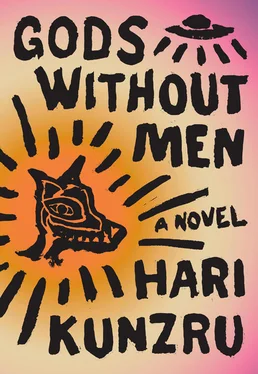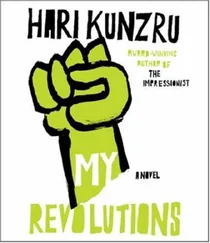Over in the shade of the mine car was a third man, squatting on his haunches beside the rails, chipping at a lump of ore with a hammer.
“What’s the Chinaman doing here?”
The German shrugged. “Working.”
“Damn yellow ape.”
He did not give way to anger, though for a moment there came a noise of wings, like the noise of great waters. The Chinaman paused in his task and peered at him from under his wide straw hat.
“Don’t you dare look at me.”
The Chinaman turned away and took up his hammer again. Least it wasn’t a nigger. Parr was very clear on niggers. The Lord God had caused a cursing to come upon the Lamanites, a sore cursing because of their iniquity. They had hardened their hearts against Him and He had caused that they should be loathsome unto His people’s eyes. He’d used up more than one of the devils during the war between the States and it was on account of such a killing that he’d lost his wives and been cast out to wander in the desert. That one had been got up as a preacher no less, a light-skinned buck who’d taken a high-and-mighty tone as he proffered his coin at the ferry crossing. If there was one kind of coon Parr hated harder than all the others, it was a yellow. Boy, he’d said to that monkey of a preacher, shall I tell you the law of God in regard to the Negro Race? If a white man mixes his blood with the seed of Cain, the penalty is death on the spot. The nigger said he never heard of such a law. He shot him in the face.
The German brothers fell to lighting a little potbellied stove and he sat and ate with them and afterward they smoked and the older one asked if he would perform a divination as to the quality of the coming amalgamation. It was a trivial matter but he felt agreeable and so he took off his hat and placed the Urim and the Thummim over his eyes and overhead the sky cracked and it was as if a wheel stood before him, comprising seven wheels, one turning into the other. The seven hubs in the middle were like one hub eternally giving birth to the rims and the spokes of the wheels, and this divine airship manifested itself in the way it had for many months and years, emerging out of groundlessness to guide him on his spiritual path. In the light of the airship he saw every moment of his life, as if the whole was presented before his sight like a tapestry, from the time of his birth at Ambrosia on Marrowbone Stream to the present instant in which he sat with the twin gems over his eyes, speaking prophecy. He saw his mother lifting him up in his swaddling clothes to show him the true site of the Garden of Eden, there in Jackson County, Missouri, and saw himself climbing trees and fishing in the water and recalled that place as his own Eden, with orchards and ponds and hives of honey and full cribs of corn. He saw the Gentile mob tarring and feathering his father and the cabin burning and the oxen lying shot in the field. He saw the Saints run off their land and the militia riding in to Far West with their soot-blackened faces. He saw the rope and the rim of the well and the tangle of limbs at the bottom, and as all things arise from one by the mediation of one, he saw that all things in his life had their birth from this one thing by adaptation. The sun was his father, the moon his mother; the wind had carried him in its belly, the earth had been his nurse. He spake words of prophecy and afterward all was silence and darkness and void.
The next morning he awoke and began the work of amalgamation. As the older brother drove the mules, he and the younger poured water. When he judged the consistency of the paste in the arrastra bed to be right, he directed the brothers to stop while he made an assay of the mud, turning it over in his hands, noting the way it slid through his fingers: not too watery, but slick, rich, the trapped silver singing loud to him, begging for release. Helped by the younger brother — he refused to let the Chinaman anywhere near the work — he sprinkled rock salt and magistral into the mix, and made another assay. By that time it was late afternoon. They rested the mules and sat down to wait for moonrise. They smoked and drank coffee and when the white moon appeared over the mountains, waxing gibbous, he stood and turned to them and raised his hands.
“In the name of Jesus,” he testified, “I tell you this is the very Spirit of Truth. From the world’s beginning all the Saints have desired to behold its face.” The Germans looked up, tin cups gripped in their fearful hands, two mustached faces silvered by the moonlight. He showed them a flask of Almadén quicksilver, mined and purified in the Sierras, unscrewed the stopper and poured the precious fluid out into an iron tub. There it lay shimmering, paradoxical and mysterious. “As Christ is my witness, I am telling you no word of a lie. What you see is the very light of Jesus, flowing down into the darkness of matter. It dwells in fiery form in the sky and leads Earth up to Heaven. It is the Secret, hidden from the beginning. I tell you, it transcends both life and death.” And then, as always when he spoke in this manner, he was broken up by emotion and began to weep, for, in his own evocation of the threshold, he saw again the rim of the well, the rope, the feminine arms and legs in their slop of blood and calico. Three raped sister wives, stuffed in there by the Gentiles. He was the smallest, twelve years old. They’d lowered him in a sling while his brother Jed cut the husband down from a tree. It was too much and he’d swooned and he never saw his home country again after that, for when he came round they’d crossed the river and were already in Illinois.
Together the German brothers looked upon the quicksilver and under his direction helped to pour it into a canvas bag, and he walked round the arrastra, squeezing and kneading it so that little drops fell onto the mud like fine metal rain. As he seeded the mud, he was moved to school the brothers in the Mysteries, and whether they understood or not or cared or not and whether the Chinaman overheard or not was of no importance to him, for he told of the One out of which proceeded the Three, which are Mercury, Sulfur and Salt, and how out of those three proceeded all the many substances of the World, which are truly one substance, infused and inspirited with God’s luminous love. And that was how it was for the next days and nights while they incorporated the ore pulp and drew it off and spread it out under the scorching sun for Apollo’s fire to work its influence. He preached and testified and the quicksilver sought out the precious metal in the mud and bound itself to it, drawing the comely light of the Lord out of the base nigger darkness of matter.
Every morning he made an assay, rubbing the silvery mud between his fingers, shaking sediment in a glass flask and watching it fall. They had ten mules and the Chinaman walking through the cake of ore pulp to mix it through, and sometimes its body was hot and sometimes cold, and he added quicksilver and magistral as needed to balance the two principles. Little by little, the amalgamation progressed, and they washed and rinsed and purified and reduced and daily there was less gray offal in the swirling flask and the shining globule of amalgam that sank to the bottom was fatter and more solid and shone brighter than before. And on the twenty-third day it seemed to Nephi Parr that the final work should begin and he gave the order to light the furnace.
While the brothers waited for moonrise, he took a spyglass and climbed the peak above the mine. The sun was setting and the desert was washing its robe in red, as if preparing for some nocturnal orgy. As he climbed he wondered if death was finally overtaking him, for he thought he heard a flapping of great wings and above his head the firmament was like a sapphire throne, studded with agate and beryl and porphyry and chrysoprase. His whole left side was numb and under his shirt the skin was peeling away from his back. Do not call me to judgment, Lord, he begged. Not until I have completed this last work. He surveyed the land through the spyglass. At his feet the cliff tipped away into the void and he knew himself for a sinner whose bones would bleach out on the sands and whose disfellowshipped soul would never enter the Celestial Kingdom, clutching its scrying stone, for the light that played across the desert’s white body seemed not the singular and steadfast light of God but the mutable light of Mercury, laughter of fools and wonder of the wise. And then he dropped the spyglass and saw it shatter on the ground, for a sign had been given him: Until their magnified appearance before his squinting eye he had not known the Lost Promise mine looked down on Three-Finger Rocks, where once he had felt ease of heart and certainty of purpose, waiting with Porter Rockwell to enact salvation upon one Lyman Pierce, who had traveled very far from Illinois to atone for his sins.
Читать дальше












